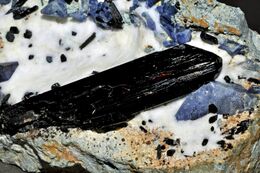Neptunite
Topic: Chemistry
 From HandWiki - Reading time: 2 min
From HandWiki - Reading time: 2 min
| Neptunite | |
|---|---|
 Neptunite crystals | |
| General | |
| Category | Phyllosilicate |
| Formula (repeating unit) | KNa2Li(Fe2+,Mn2+)2Ti2Si8O24 |
| Strunz classification | 9.EH.05 |
| Dana classification | 70.04.01.01 |
| Crystal system | Monoclinic |
| Crystal class | Domatic (m) (same H-M symbol) |
| Space group | Cc |
| Unit cell | a = 16.427(2), b = 12.478(2) c = 9.975(1) Å; β = 115.56(1)°; Z = 4 |
| Identification | |
| Color | Black; deep red-brown in thin fragments |
| Crystal habit | Prismatic or tabular |
| Twinning | Interpenetrant on {301} |
| Cleavage | {110} good |
| Fracture | Conchoidal |
| Tenacity | Brittle |
| Mohs scale hardness | 5–6 |
| |re|er}} | Vitreous |
| Streak | Brown to red brown |
| Diaphaneity | Nearly opaque |
| Specific gravity | 3.19–3.23 |
| Optical properties | Biaxial (+) |
| Refractive index | nα = 1.69–1.6908, nβ = 1.6927–1.7, nγ = 1.7194–1.736 |
| Birefringence | 0.0294–0.0452 |
| Pleochroism | x = yellow-orange, y = orange, z = deep red |
| 2V angle | 36° to 49° |
| Other characteristics | Piezoelectric |
| References | [1][2][3] |
Neptunite is a silicate mineral with the formula KNa2Li(Fe2+, Mn2+)2Ti2Si8O24. With increasing manganese it forms a series with mangan-neptunite. Watatsumiite is the variety with vanadium replacing the titanium in the formula.
It was first described in 1893 for an occurrence in the Narssârssuk pegmatite of West Greenland.[2] It is also found within natrolite veins in glaucophane schist within serpentinite in San Benito County, California, US. It also occurs in Mont Saint-Hilaire, Quebec[5] and in the Kola Peninsula of Russia .[1]
The mineral is named for Neptune, Roman god of the sea because of its association with aegirine from Àgir, the Scandinavian sea-god.[2]
The Gemological Institute of America (GIA) identified an 11.78-carat faceted specimen as neptunite based on Raman spectroscopy.[6]
References
- ↑ 1.0 1.1 Anthony, John W.; Bideaux, Richard A.; Bladh, Kenneth W.; Nichols, Monte C. (2005). "Neptunite". Mineral Data Publishing. http://www.handbookofmineralogy.org/pdfs/neptunite.pdf.
- ↑ 2.0 2.1 2.2 Neptunite, MinDat.org, http://www.mindat.org/show.php?id=2883
- ↑ Webmineral
- ↑ Warr, L.N. (2021). "IMA–CNMNC approved mineral symbols". Mineralogical Magazine 85 (3): 291–320. doi:10.1180/mgm.2021.43. Bibcode: 2021MinM...85..291W.
- ↑ Normand, Charles; Tarassoff, Peter (2006). Mineralogy and geology of the Poudrette quarry, Mont SaintHilaire, Quebec. Mineralogical Association of Canada. https://www.mcgill.ca/redpath/files/redpath/guidebook_4a_final2.pdf. Retrieved 12 March 2022.
- ↑ Cooper, Amy; Allen, Tara (Summer 2013). "Rare faceted neptunite". Gems & Gemology (Gemological Institute of America) 49 (2). https://www.gia.edu/gems-gemology/summer-2013-labnotes-rrare-faceted-neptunite. Retrieved April 18, 2019.
 |
 KSF
KSF